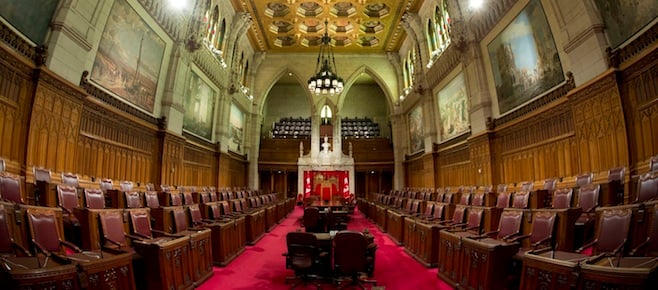The Senate vs. The Fair Elections Act
Senators seem prepared to propose amendments
(Adrian Wyld, The Canadian Press)
Share

First the Globe and now the CBC and Canadian Press are reporting that the Senate’s legal and constitutional affairs committee, which had been studying the Fair Elections Act, will be recommending changes to the bill. The reported changes seem to include a mix of obvious compromise points and novel ideas. There’s no suggestion yet that any of the changes deal with the moving of the elections commissioner out of Elections Canada. The Globe had suggested the committee will recommend that voter information cards be permitted as a way to substantiate a voter’s address, but the Canadian Press says that’s not going to be among the recommendations. (CP also says that the Senate doesn’t recommend reversing the government’s proposed ban on vouching.)
I’ve not been able to confirm any of these reports as yet, but via email to me, Conservative Senator Don Plett, a member of the Senate committee, offered that, “I will say this that it is not a push back by the committee as indeed it was the Minister that asked that we study the bill.”
This does at least add another twist to long and twisty tale of this bill’s journey toward royal assent.
The Senate committee will apparently table its report this week, possibly as early as tomorrow. That will put its recommendations on the record before the House committee studying the bill has gotten to the point of discussing amendments (the procedure and House affairs committee is, I believe, set to hold one more hearing with witnesses on Monday, April 28, when the House of Commons reconvenes after the Easter break).
The House committee, with a Conservative majority presumably holding sway, could agree to amend the bill in line with some or all of the Senate committee’s recommendations. Or it could choose to ignore some or all of the Senate’s recommendations.
Part of that decision could conceivably involve answering one question: How many Conservative senators are willing to refuse to pass the Fair Elections Act unless the recommended changes are made? It would conceivably have to be a significant number.
The current standings in the Senate give the Conservatives 57 of the 93 occupied seats (nine spots are vacant, three senators are currently suspended). The Speaker of the Senate is Conservative, so that puts 92 votes in play with 56 Conservatives. So if all of the non-Conservatives voted against the bill, 11 Conservatives would be needed to make the necessary 47 votes to defeat C-23 or send it back to the House for revision.
That could then, conceivably, result in a conference between the two houses of Parliament.
But let us not get ahead of ourselves. Alternatively, all or enough of the Senate committee’s recommendations will be accepted, the government will get to say that it compromised and the Senate will get to say that it made a contribution to the formation of public policy.